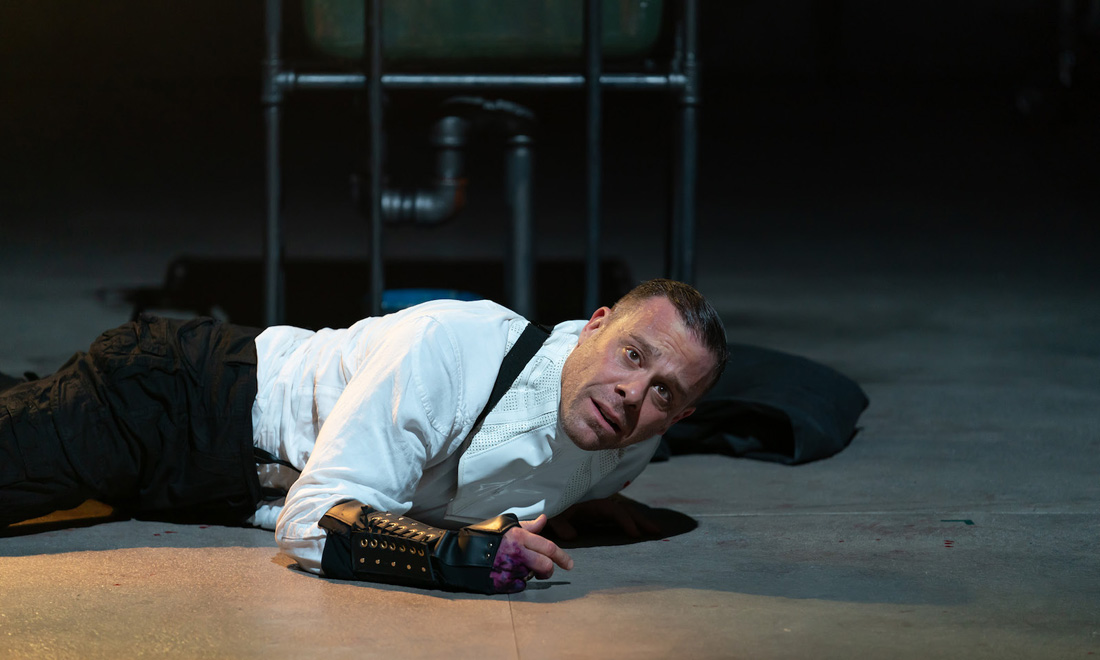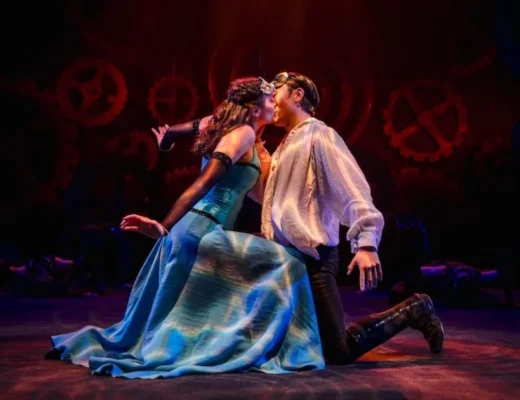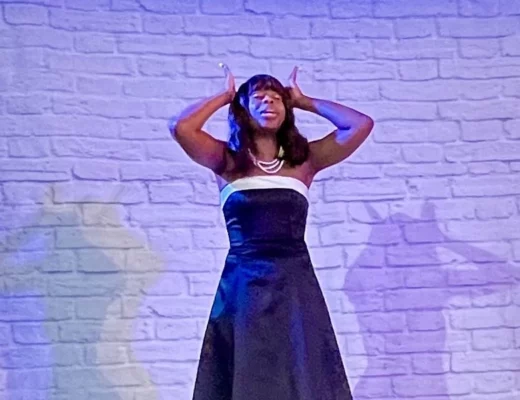This article was first published in The DC Line here.
How often have you flung up your hands and decried this moment of “political theater” in the United States? Richard III — showing through Sunday at Shakespeare Theatre Company’s Sidney Harman Hall — stands among Shakespeare’s great works of conscience not only in its exposure of power-hungry depravity, but also in demonstrating how the public’s participation is what makes such depravity possible. Fling up your hands no more: You play an essential role in this production.
Director David Muse highlights the play’s “great treatment of complicity,” which makes it an excellent choice for the present day — a point made not only in his production notes but also in “Bookends,” a Shakespeare Theatre Company (STC) audience engagement program designed to deepen and democratize the conversation between theater and audience. The pre- and post-show event is held for one performance night of every play the STC stages, beginning with a facilitated dialogue about the historical context of the play and its place in popular imagination, and ending with a cast Q&A.
Samantha Wyre Bellow, senior director of education, and Drew Lichtenberg, literary manager, kicked off the Feb. 13 discussion by emphasizing the vast interpretive possibilities of Shakespeare’s living texts while providing a helpful framework for critically viewing this particular production. Fracturing the lens of centuries past, they encouraged the audience to watch for echoes of our own era in the play — and to be wary of the ways in which, Wyre Bellow argued, “the villain takes us along as accomplices.”
Richard III chronicles the Duke of Gloucester’s murder- and manipulation-paved rise to the crown, and his ultimate demise. A play whose first act sees Richard engineer his brother’s imprisonment and assassination is not about the making of a tyrant so much as the way the world responds to tyranny. We watch as lords ally themselves with the Duke for personal gain, only to lose their heads when their utility expires; attendants do his bidding with blind loyalty, and the public eats up his campaigns of misinformation.
Despite its overt politicism, Richard III is only as cutting as the director’s editorial eye. One of Shakespeare’s early plays — and one of his longest — it is bogged down by references to British history and a parade of minor characters. For the STC’s production, Muse has winnowed away 40 percent of the original text. Though the play remains dense, uneven and occasionally prosaic, Muse’s excerpting helps propel the plot.This serves his overarching goal of clarity, as does his gift to the audience of a dramatis personae projected in lights above the stage as each character enters.
This production is contemporary, but avoids the limiting trope of tying Richard to any one moment or figurehead. Costume designer Murell Horton’s clean-cut gray suits and neutral gowns feel austere and timeless. Debra Booth’s chilling set places us in an abattoir of gray, rusting walls and industrial machinery, lit by an enormous operating-room light — anywhere’s underbelly.
In this wintry hell, Matthew Rauch plays the title character as an understated devil. His hasty delivery of Richard’s opening soliloquy establishes a steely and expedient villain with whom we won’t be asked to empathize. Though never plumbing beyond a sociopathic interpretation of the character, Rauch swings an impressive arc. His early magnetism comes from quick-tongued repartee and limitless audacity. His confidence grows along with his body count, but his giddiness diminishes as he adjusts to success. When allies dissipate and his downfall nears, he physically disintegrates before our eyes; inconspicuous in earlier acts, the disability he obsesses over crystallizes as a property of his own fear and self-loathing.
Rauch is surrounded by strong performances of underdeveloped characters. Cara Ricketts is a firebrand Lady Anne, whose deeply ambiguous wooing scene suggests that she is not stupidly seduced by Richard, but is making a calculated move to align herself with political power. Derrick Lee Weeden’s Lord Hastings blusters through his misgivings all the way to the chopping block. More cog than character here, Christopher Michael McFarland’s Buckingham has little personality beyond the obedience he mistakenly thinks will buy Richard’s good graces. As the young princes standing in the way of the Duke’s succession, Charlie Niccolini and Logan Matthew Baker play up their boyishness, demonstrating how two royals might place trust in such an unsettling uncle.
Then there’s the ensemble, who stamp their feet and whet their knives to foreshadow bloodshed. No murder takes place in off-stage secrecy as envisioned in Shakespeare’s text. Instead, the ensemble chants, dances, and encircles the bodies. This dramatization often feels heavy-handed, especially when coupled with the too-sinister score. In moderation, though, it could have been a good device to implicate the whole kingdom — and ultimately the rapt audience — in the villainy afoot.
Throughout the show, center stage is occupied by a misogynistic Richard, yet in this production the women wield the greatest power. Although the Duchess of York (Sandra Shipley) and Queen Elizabeth (Robynn Rodriguez) are played one-note, they are the only ones in Richard’s circle to truly defy him. Lizan Mitchell’s Margaret of Anjou reverberates with the presence of an oracle when issuing her prophetic curses — perhaps delivering too much spectacle, though it’s fitting that the conscience of such a play would feel out of place.
Importantly, women aren’t limited to providing the play’s moral compass; Sofiya Cheyenne is a compelling Mayor of London who decides to play Richard’s pawn to save her own skin. Evelyn Spahr — a young woman — is cast as the Earl of Richmond, who ultimately defeats Richard and restores order to England. The choice to cast women in these traditionally male roles dominated the discussion in the “Bookends” closing Q&A. “I think there is power in a woman holding power at the end of the show,” Cheyenne commented.
The show ends with a resounding inhalation, ostensibly a breath of hope. It should also serve as a suspenseful pause. History has shown us that the toppling of one Richard does nothing to impede the rise of the next. Real tyrants’ magnetism often draws us in until our own hands are covered in the blood they’ve spilled. At its best, this involving production is not a diversion, but a useful wake-up call.
Shakespeare Theatre Company’s production of Richard III opened Feb. 5 and continues through March 10 at Sidney Harman Hall, 610 F St. NW. Tickets cost $44 to $125.





No Comments